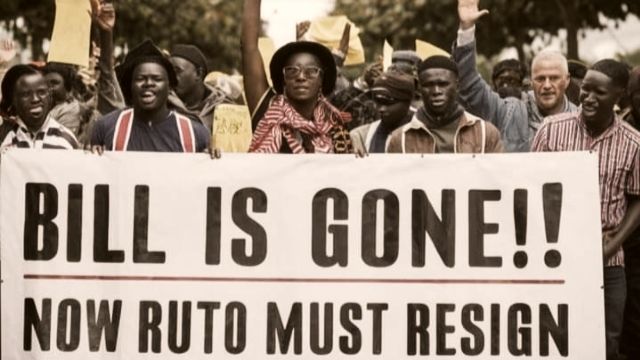Days after protesters stormed the Kenyan Parliament to stop a controversial finance bill, resulting in police firing that killed 22, they still demand the resignation of President Wiliam Ruto, whom they blame for the fiasco.
Although Kenya’s state-sponsored human rights organisation Kenya National Commission on Human Rights expressed its concern over the killing of protesters, the president has blamed “extremist” elements for Tuesday’s storming of the Kenyan Parliament.
Mr Ruto has said “he will not sign a financial bill providing for major tax increases” on July 26th after considering ongoing deadly riots in the country.
Recently, the Kenyan Parliament—National Assembly of Kenya—passed a finance bill introducing controversial taxes. The International Monetary Fund (IMF)-pushed tax reforms aiming to raise $2.7bn through increased taxation on things such as bread and car ownership to compensate for the country’s budget deficit.
Despite the massive outrage, Kenyan lawmakers approved the finance bill on Tuesday by 195 votes to 106. The legislation now needs the president’s, ie, Mr Ruto’s signature who till now is in a proposition of holding talks with youth.
This passing of the finance bill has caused massive public outrage in the country, which has reportedly taken the lives of more than 31 protestors.
On Tuesday, Police handled the protest peacefully but after that, tear gas, bullets and launcher canisters were used.
The storming of the Kenyan Parliament has also led to damages to the building and an emergency evacuation of lawmakers through a tunnel.
The Kenya Medical Association, Amnesty International, the Law Society of Kenya and the Police Reforms Working Group are continuously raising their concern over protests and ongoing causalities.
The president tagged protests as “treasonous events” and “mobilised protest” on June 25th. United Nations Secretary-General Antonio Guterres said he was “deeply saddened by the reports of deaths and injuries—including those of journalists and medical personnel— connected to protests and street demonstration in Kenya”.
Protesters are continuously asking for a shutdown of the Parliament and the resignation of every member. News agency Reuters quoted an unnamed protester saying, “We want a new government” with continuous threat of “proper shut down”.
Recently, countries like Russia and India have shared an advisory through their embassies in Kenya. According to official data, around 20,000 Indians are currently living in Kenya. The Indian Embassy in Kenya has shared an advisory on X to restrict non-essential movement and avoid visiting the protest–affected areas until the situation improves.
Kenya’s protests against the IMF-pushed tax reforms have again highlighted how the anti-welfare economic liberalisation diktats are forced on global south countries by such institutions.
The violent crackdown of the Kenyan protests showed how global south countries, tied with institutions like the IMF, disregard the human rights and democratic rights of their people to push through unpopular economic reforms.
Join our channels on Telegram and WhatsApp to receive geopolitical updates, videos and more.


